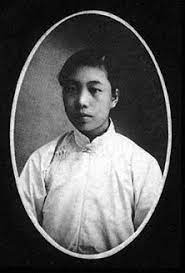Hsü Kuang-p'ing (1907-), was the wife of Lu Hsün (Chou Shu-jen, q.v.). After his death in 1936, she began to collect and edit his unpublished works to write articles about him. After 1949 she served the Central People's Government as a member of many committees and delegations.
Little is known about Hsü Kuang-p'ing's background or childhood except that she was a native of P'anyü, Kwangtung. After being graduated from a junior normal school in Canton, she became a teacher. To further her education and avoid an arranged marriage, she left Canton and went to Peking. In 1923 Hsü Kuang-p'ing entered the Peking Women's Higher Normal School, where she majored in literature. At this time, Lu Hsün (Choü Shu-jen, q.v.) was teaching at the school and at National Peking University. In March 1925 Hsü wrote to Lu Hsün asking for advice and guidance. Thus began a regular correspondence, which later was collected and published as Liang-ti shu. As a student, Hsü's chief interests were literature and politics. She contributed essays to the magazine Mang-yuan [thicket], of which Lu Hsün was the chief editor; and she served as chairman of the students association at the school. In May 1925 she led a student movement to oust the principal. As a result, she was suspended from school. Lu Hsim also participated in the movement, and he was dismissed temporarily from his ministry of education post.
After being graduated from the Women's Higher Normal School, Hsü Kuang-p'ing left Peking in May 1926 to teach at the Women's Normal School in Canton, where she also was in charge of student discipline. She resigned about six months later because of student disturbances. After Lu Hsün became head of the Chinese literature department and academic dean at Sun Yat-sen University, Hsü Kuangp'ing became his assistant and common-law wife. In April 1927 Lu Hsün resigned, protesting the Kuomintang's persecution of leftist students at Sun Yat-sen University. He and Hsü remained in Canton for a few months, and on September 27th, a boy was born to them. They named him Hai-ying.
In October 1927 Hsü Kuang-p'ing, Lu Hsün, and their child left Canton and went to live in Shanghai. Their life was not peaceful: after 1930 Lu Hsün was under constant threat of arrest because of his leftist activities and his hostility to the Kuomintang. Hsü Kuang-p'ing was his constant companion and provided him with a family life that undoubtedly was his refuge and consolation.
After Lu Hsün died in 1936, Hsü remained in Shanghai. She began to edit and collate Lu Hsün's unpublished works and to write articles of reminiscence. After the Sino-Japanese war broke out in 1937, she and Cheng Chen-to (q.v.) organized the Fu She [recovery society] to promote the anti-Japanese movement. She was arrested by the Japanese on 15 December 1941 and imprisoned for two months. She remained in Shanghai throughout the period of Japanese occupation. When the war ended, Hsü Kuang-p'ing became the editor of the Min-chu [democratic weekly] and a delegate to the National Assembly. She also was active in women's organizations, serving as chairman of the Shanghai Women's Fellowship Society and the Shanghai branch of the China Women's Federation.
After 1949, Hsü Kuang-p'ing served the Central People's Government in such positions as: a member of the standing committee of the National Committee of the Chinese People's Political Consultative Conference; vice chairman of the All-China Federation of Democratic Women; board member of the Chinese People's Society for Cultural Relations with Foreign Countries; and member of the standing committee of the China Association for Promoting Democracy. However, there is no evidence that she became a member of the Chinese Communist party. She served as head or a member of many delegations to foreign countries, including those to: the anniversary of the October Revolution in Moscow (1948, 1953); the fifth council meeting of the Women's International Democratic Federation in Geneva 1955); the Second World Conference for the Prohibition of Nuclear Bombs in Nagasaki and Tokyo (1956); the Congress on Disarmament and International Cooperation in Sweden (1958); and the Afro-Asian Writers Conference in Tashkent (1958).
Hsü Kuang-p'ing's chief contributions to Chinese literature were her work in editing and collating Lu Hsün's work and her writings about him. Among her important publications is her edition of the Lu Hsün shu-chien [letters of Lu Hsün], originally published in 1946. She also contributed to the Lu Hsün ch'uan-chi [complete works of Lu Hsün], published in Peking in 1957.

许广平
字:漱园
许广平(1907—),鲁迅夫人。1936年鲁迅去世后,她收集编订鲁迅未曾发表过的著作,并撰写有关鲁迅的文章。1949年后,在中央人民政府中担任许多委员会的委员和代表团的代表。
许广平的家庭和幼年情况不详,只知她是广东番禺人。她在广州初级师范毕业后当过教员。为了升学和逃避包办婚姻,她离开广州到了北京。
1923年,她进了北京女子高等师范学校,主修文学。当时,鲁迅在该校和北京大学教书。1925年3月,许广平写信给鲁迅请求指导,此后就开始了经常的通信,以后编印出版为《两地书》。学生时代许广平的注意力在文学和政治。她在鲁迅主编的《莽原》杂志上投稿,她是该校学生会主席。1925年5月,她领导驱逐校长的学生运动,结果被迫停学。鲁迅也参与了这次运动,因此被免去了他在教育部的职务。
许广平自北京女高师毕业后,1926年5月离北京去广州女子师范学校教书,还负责训育,由于闹学潮,六个月后就辞职了。后来,鲁迅任广州中山大学中文系主任兼教务主任,许广平成为他的助手并与他同居。1927年4月,鲁迅因抗议国民党迫害中山大学左派学生,于1927年4月辞职,他们在广州住了数月,9月27日生了一个男孩,取名海婴。
1927年10月,他们一家三口离广州迁居上海。他们的生活是不安定的,1930年后,鲁迅的左倾活动和对国民党的敌视,使他经常有被捕的危险。许广平经常陪伴着他,这无疑给了他以护庇和慰籍。
1936年鲁迅去世后,许仍在上海,开始编订鲁迅未发表的著作,并撰写回忆文章。1937年,中日战争发生后,她和郑振铎组织了一个“复社”鼓吹抗日运动。1941年12月15日她被日军逮捕监禁了两月。在整个日本占领上海期间,她一直在上海。
战争结束后,许广平任《民主》周刊编辑,国大代表。她在妇女组织中很活跃,任“上海妇女联谊会”主席、“中国妇女联盟”上海分会主席。
1949年,许广平在中央人民政府历任各职:政协全国委员会常委,民主妇联副主席,对外友协理事,民主促进会常委,但并无加入中国共产党的迹象。她还充当过多次代表团团长或团员出国访问,1948年、1953年两次去莫斯科参加十月革命纪念;1955年去日内瓦出席国际民主妇联第六次理事会;1956年去长崎、东京出席禁止核弹的第二次世界会议;1958年在瑞典出席裁军和国际合作会议;1958年去塔什干出席亚非作家会议。
许广平对中国文坛的主要贡献是她编订鲁迅的著作和撰写有关鲁迅的作品。她所编辑的主要出版物中有《鲁迅书简》,最初于1946年出版。她在1957年北京出版的《鲁迅全集》工作中,也作出了贡献。